North Korea and South Korea have been in tension since the Korean War ended in 1953. The two countries have been locked in a state of hostility for over 60 years, with each accusing the other of not wanting peace. Despite attempts to resume talks and engaging in economic exchanges, the two countries remain at odds. To understand the full history and underlying reasons for why North Korea and South Korea remain estranged, it is vital to look at their respective histories and the events that unfolded.
Since the end of the Korean War, North Korea has had a government based on communism, while South Korea has been based on democracy. This distinction has been a major source of contention between the two countries, as each side attempts to establish its own ideology. In addition, North Korea follows the teachings of its late leader Kim Jong-il, while South Korea’s democratically elected leaders have moved away from authoritarianism.
The conflict between North Korea and South Korea is also fueled by ideological differences. North Korea has a strong nationalist ideology, while South Korea adopts more liberal policies and allows more freedom of opinion within its population. North Korea’s singular view of the world and its leaders’ total rejection of outside interference risks isolating them from the international community, while South Korea is open to more dialogue and communication. As such, North Korea views South Korea, and its efforts to engage with the world, as a threat.
Another key factor in the conflict is the demilitarized zone which separates the two countries. In 1953, the two countries signed an armistice agreement which established the DMZ, a 2.5 mile wide buffer zone between the two countries. Both sides remain heavily militarized and tensions in the area remain high. North Korea’s leadership is wary of South Korea’s closer ties to the U.S., as well as its increasingly integrated economy.
The two countries also disagree on emotional issues. Many South Koreans feel a lingering sense of humiliation and pain over the loss of millions of lives and material possessions in the Korean War. This has resulted in an emotional divide between the countries. North Koreans, on the other hand, are still fueled by feelings of national pride, as they view themselves as having ‘won’ the war.
North Korea has also taken a stronger stance against South Korea’s alliance with the U.S. North Korea sees America’s presence in the region as a threat to its independence, while South Korea sees the alliance as an important tool for defending its national security. This disagreement has been at the root of countless skirmishes and military exercises, leading to further hostility between the two countries.
Human Rights
Human rights is another issue that often separates the two countries. North Korea has been accused of widespread human rights violations, including torture, forced labor, and censorship. Meanwhile, South Korea has made strides in protecting and advancing the rights of its citizens, adopting more progressive policies such as decriminalizing homosexuality and implementing a universal healthcare system. North Korea views South Korea’s advances in these areas as a challenge to its own government and philosophy, and often retaliates by launching verbal and physical attacks against the South Korean government.
Cultural Differences
Cultural differences are also a major source of tension between North Korea and South Korea. North Korea has a distinct culture and set of beliefs, while South Korea has inherited values from both its indigenous traditions and other influences. North Korea’s leadership views South Korea’s open and diverse culture as a form of Westernization, which it views as a threat to its own culture.
Propaganda
Propaganda is also a source of the conflict between North Korea and South Korea. North Korea has a long history of using propaganda to portray South Korea as an imperialistic and oppressive government, while simultaneously portraying itself as the protectors of freedom and justice. This has had a powerful psychological effect on both North and South Koreans, making reconciliations more difficult.
The Role of China
China’s relationship with North Korea has also been a major factor in the conflict between North and South Korea. China is one of North Korea’s closest allies, providing it with military and economic aid. China has also sought to mediate between the two countries, helping to facilitate talks and exchanges, while at the same time attempting to keep North Korea from taking any drastic action.
Conclusion
The underlying reasons for why North Korea and South Korea remain estranged are complex and varied. A combination of centuries of both physical and emotional separation, coupled with an ideological clash, and a belligerent propaganda campaign has created a hostile environment between the two countries. While the two sides may both desire peace and reunification, the intensity of the conflict and the mistrust between both sides may prevent that from becoming a reality.

